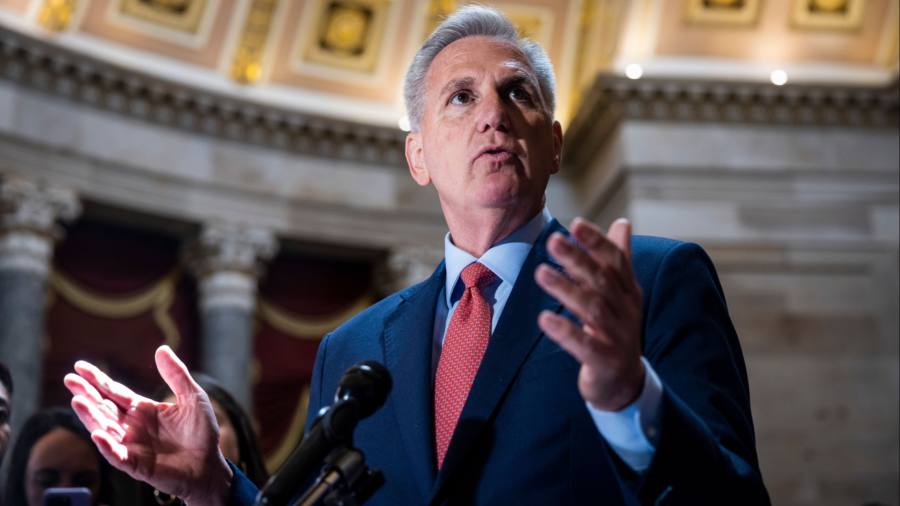Fitch, the credit rating agency, has placed the US’s triple A rating on watch for a possible downgrade as talks to resolve a looming fiscal crisis dragged on without a deal nearly a week before a possible default.
In a statement on Wednesday evening, Fitch said the move reflected “increased political partisanship that is hindering reaching a resolution” on the debt ceiling. While Fitch still expected a deal to be reached, it said the risks have risen that the government could miss payments on some of its obligations.
“The brinkmanship over the debt ceiling, failure of the US authorities to meaningfully tackle medium-term fiscal challenges that will lead to rising budget deficits and a growing debt burden signal downside risks to US creditworthiness,” it said.
Fitch’s warning came after White House and Republican negotiators met for the latest round of talks to reach an agreement that would raise the country’s borrowing limit before it runs out of cash to pay all its bills as early as June 1.
But Kevin McCarthy, the Republican Speaker of the House of Representatives, said investors had nothing to fear from the impasse.
“We are working night and day. I would not, if I was in the markets . . . be afraid of anything in this process. I wouldn’t scare the markets in any shape or form,” McCarthy told Fox Business. “We will come to an agreement when we get it, worthy of the American public, and there should not be any fear.”
Janet Yellen, the US Treasury secretary, had earlier in the day reiterated her forecast that June 1 was the critical deadline. Speaking at an event with The Wall Street Journal, she said the uncertainty over the debt ceiling was already causing “some stress in financial markets”, adding that Treasury bills coming due in early to mid-June were “trading at . . . significantly higher rates”.
Investors have been avoiding bonds maturing in early June, driving the price of those securities dramatically lower. In early May, the Treasury department was forced to auction off four-week bills at the highest yield ever to entice buyers.
The stress is not limited to the debt market. Stocks have dropped this week, with the blue-chip S&P 500 and the tech-heavy Nasdaq Composite both down nearly 2 per cent.
“I think that should be a reminder of the importance of reaching a timely agreement,” Yellen said, warning there could be “substantial financial market distress” even in the run-up to an eventual agreement.
McCarthy offered only a slightly improved assessment of the talks on Wednesday afternoon, saying they had gone “a little better” but there remained a gap on spending levels. Republicans have demanded deep cuts to discretionary spending, while the White House has proposed freezing spending at existing levels next year.
The White House did not comment on the outcome of Wednesday’s talks, but Karine Jean-Pierre, the press secretary, told reporters earlier that President Joe Biden still hoped for a bipartisan deal.
In the absence of an agreement, the House told lawmakers they could return to their districts for the upcoming Memorial day weekend, but warned them they should be prepared to come back to Washington on short notice.
McCarthy has said the House would need 72 hours to review legislation before a vote, after which it would move to the Senate. Even though Senate leaders could try to expedite the legislation, it has become increasingly difficult to enact any bill by June 1, the first possible day for a default.
McCarthy sat down with Biden on Monday for talks that the two leaders described as “productive”, after the president cut short his overseas trip after the G7 meeting to be in Washington for debt ceiling negotiations. But they have not for now set another in-person meeting.
Both Biden and McCarthy are under increasing pressure from the left and right flanks of their parties, respectively, to reject calls for compromise.
The most hawkish members of McCarthy’s conference have brushed aside fears of a default and suggested the Treasury can simply prioritise debt payments.
But Yellen dismissed those claims on Wednesday: “Our payment systems have been constructed in order to pay our bills, not to decide which bills to pay and which bills not to pay.”
“As a general matter, prioritisation is not really something that’s operationally feasible,” she added.
In a Brookings report, Wendy Edelberg, a senior fellow, warned of mounting costs should market stress persist as the debt ceiling stand-off drags on.
Given the Treasury market’s standing as the safest haven across the global financial system, the US government has benefited from lower borrowing costs than other countries, which Edelberg said translated to interest savings of more than $750bn over the next decade.
“If a portion of this advantage were lost by allowing the debt limit to bind, the cost to the taxpayer could be significant,” she wrote with her colleague Noadia Steinmetz-Silber.
They noted that premiums have already risen on debt set to mature in June, and should that eventually extend to all maturities, interest costs to finance the federal debt could increase by more than $4tn.
Read the full article here




